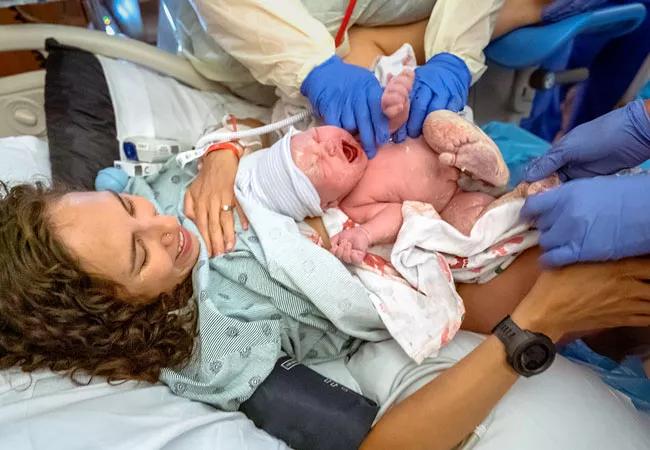Nurses and doulas work together to care for expectant moms

Image content: This image is available to view online.
View image online (https://assets.clevelandclinic.org/transform/4bfb78f5-d390-413d-b276-1addf1fff896/23-NUR-3807622-DoulaProgram-CCIRcommunity-CQD_650x450_jpg)
23-NUR-3807622-DoulaProgram-CCIRcommunity-CQD_650x450
Cleveland Clinic Indian River Hospital in Vero Beach, Fla., partners with Indian River County Healthy Start to offer a doula program for expectant mothers.
Advertisement
Cleveland Clinic is a non-profit academic medical center. Advertising on our site helps support our mission. We do not endorse non-Cleveland Clinic products or services. Policy
“A doula is a non-medical support person that helps women during their pregnancies, through birth and during the postpartum period,” says Megan McFall, B.Ed., RN, who helped launch the program as director of women’s health at the hospital.
The program has impacted outcomes at Indian River Hospital in several areas, including:
Equally important, the program improves the patient experience.
“The doula program isn’t just support for the laboring mother. It provides emotional, physical and spiritual support from woman to woman,” says Hope Johnson, RNC, assistant nurse manager in labor and delivery at Indian River Hospital.
The doula program at Indian River Hospital began in 2016, when the CEO of Indian River County Healthy Start approached McFall after visiting a 16-year-old new mom at home with a health educator. The young woman had delivered her baby the night before in the hospital, by herself, with no support person.
“Unfortunately, there are multiple individuals who come in on a yearly basis and deliver either alone or with a support person who is less than supportive,” says McFall.
McFall and other leaders at Indian River Hospital agreed to collaborate with Healthy Start and implement the G.R.O.W. (guidance, resource, openhearted wisdom) doula program for first-time moms, patients of color or women with no support person at home. That constitutes 75% of Indian River Hospital’s expectant moms, says McFall.
Advertisement
Healthy Start goes into the local community and seeks out prospective doulas, who are then trained by a certified educator from DONA International. The doulas are contracted by Healthy Start and work with a liaison employed by Indian River Hospital.
A maternity navigator from Healthy Start meets with patients during a visit to their obstetrician and explains all the free programs offered by the organization to pregnant women and their families – including the G.R.O.W. doula program. If patients are eligible for a doula, their information is sent to a doula coordinator within their community.
“There is a marriage that takes place behind the scenes to pair up the best doula for each individual,” says McFall.
The doula reaches out to the expectant mom late in her second trimester. They discuss birth plans, and the doula attends some physician appointments to ensure everyone is on the same page. The doula shows up during active labor, stays with the mom until she gives birth and follows up with patients postpartum, offering emotional support, guidance on breast or bottle feeding, information on newborn behavior and more.
More than 70 trained doulas are available to partner with patients at Indian River Hospital, and approximately 110 women each year are supported through the program. But McFall admits the G.R.O.W. doula program had a slow start.
In 2017-2018, Indian River Hospital began partnering with the Florida Perinatal Quality Collaborative (FPQC) on a quality improvement project to promote vaginal delivery and decrease the NTSV (nulliparous, term, singleton, vertex) C-section birth rate. McFall realized doulas could be an instrumental part of the project, and she invited them to join the FPQC project.
Advertisement
“By partnering with FPQC and allowing doulas to advocate for patients and join in shared decision-making, we went from an NTSV rate of 32% in 2019 to 21% a year later,” says McFall. Today, Cesarian section rates for doula program participants at Indian River is 19%.
Those outcomes convinced caregivers of the value of doulas, who are now an accepted part of the women’s health team. There is mutual respect among clinical nurses and doulas for each other’s roles.
“Doulas and nurses work together to ensure the best patient experience by meeting and reviewing the patient’s history and personal needs through the labor process,” says Johnson. “The doula truly is an extension of the nurses. If the nurse has more than one patient, the doula is able to give that patient the support needed while the nurse is taking care of other patients.”
McFall, who became CEO of Indian River County Healthy Start in June 2023, offers the following advice to nursing leaders who are considering a doula program:
Advertisement
As an assistant nurse manager, Johnson routinely teams with doulas and has one simple piece of advice: “Do it! The support doulas give patients is irreplaceable.”
Advertisement
Advertisement
Levels of volatile organic compounds differ between preterm and full-term infants
Is it time to innovate?
Regional organizations collaborate to address nurse faculty shortage
How wellness habits help nurses flourish
Planning continues with critical, patient-focused input from nursing teams
Strengthening care through targeted resources and frontline voices
Embracing generational differences to create strong nursing teams
CRNA careers offer challenge and reward